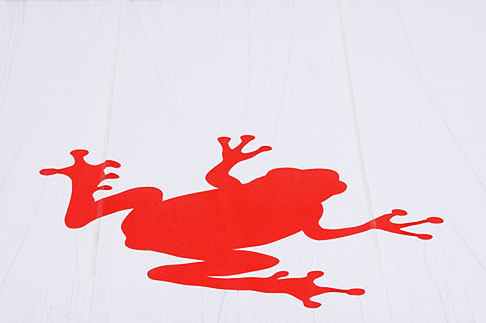If I tell you that some frogs can solve your communication issues within your team, department or even the entire company, all that within one month, will you consider this crazy?
Well, I hope your answer will be “it depends”, so I get the chance to explain myself.
Here is an hypothetical situation in an imaginary company X: the people don’t know to communicate with each other, they don’t work together, they don’t help each other, for each issue there is always somebody else at fault, they often deliver late so the company X keep loosing clients … managers try to find out who’s fault is but no results – “trainings and team-buildings were useless.”
An external consultant magically appears and propose a game. He said:
“I’ll rent you some frogs.
There are red ones and green ones, all rubber.
Those frogs are trained to search and find issues within your company.
Here is how:
– each of you in this company will receive three numbered red frogs
– you’ll offer one of these red frogs to someone you consider closest to the root of an issue you may have (you can offer maximum two red frogs each day).
– a referee will keep track who offered a red frog to whom, recording also the reason / the issue
– if the receiver is in the other team / department then you should offer the frog to the manager of that team / department
– everyone should accept a red frog and keep it at least 24 hours.
– if the one that received the frog has a solution for the issue, then:
– the referee will change the red frog with a green frog, save the solution and close the issue.
– more than that, the referee will give back one new red frog so other issues can be detected
– else, the owner of the red frog should pass along the red frog to someone he consider to be closest to the root of the issue.
I’ll come back in a month to see what my frogs found”
Q1: What are the expected results of this game?
This could be the shortest way to find out what are the real roots of any issue within the company and, more important, the solution.
And you’ll get that while not the people but the frogs will carry all the emotions deducted from mark someone as the possible root of an issue.
Mainly, when the game is over, when we talk about the issues left open, there are 2 situations:
1. the red frog reached the root of the issue: probably low skills or low motivation for that person.
2. the red frog is in a loop back: there are big chances to have a huge issue since nobody took responsibility or had a solution. maybe a paradigm-shift is needed.
Q2: What are the data collected about teams, roles and information flow within company X?
One could find out all the tasks he is supposed to take care of.
Another one could learn how others rely on him, why his results are important, what is the value of his work.
A manager could optimize the processes within his department by removing the redundancy.
Q3: Do you see any benefit in implementing this game? Any drawback?
+ The issue and the solution are more important than who’s at fault.
+ frustrations and/or fears to address any issue will be gone, the frogs will carry this, not the people involved.
+ people will better understand their role within the company
– for a large company the game should be played more times.
– also for a large company the process of tracking frogs/issues/solutions does not seem to be handy
Do you have any other answers to Q1, Q2 or Q3?
Or maybe you will just want to add something.
Then feel free to post your comments.
P.S. I cannot take the credits for the story itself, nor point out the source. It is somewhere in the cloud…

